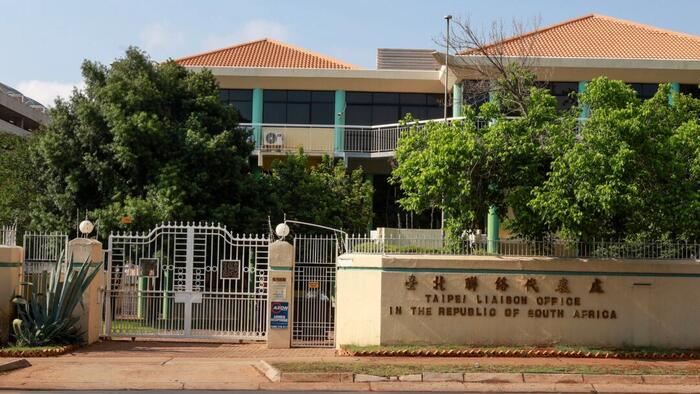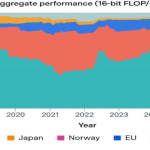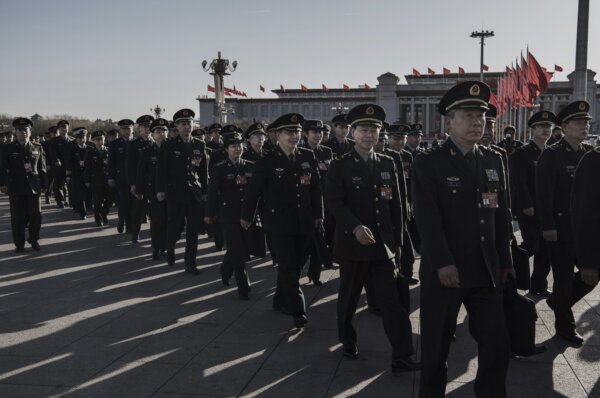Authored by Darren Taylor via The Epoch Times (emphasis ours),
JOHANNESBURG—After the South African government requested Taiwan to move its official representative office out of the capital city Pretoria, some U.S. lawmakers are condemning the decision and calling for consequences.
Chrispin Phiri, spokesman for South Africa’s Department of International Relations and Cooperation, confirmed to The Epoch Times that “The president has made it clear that the Taiwanese government must vacate its Pretoria premises by the end of October and relocate to Johannesburg or action will be taken to ensure that this happens.”
On Oct. 21, Sen. Marsha Blackburn (R-Tenn.) posted on the social media platform X that the United States “should not tolerate this behavior from South Africa.”
Blackburn called on the Biden administration “to make it clear that there will be consequences if South Africa works with the CCP (Chinese Communist Party) to bully Taiwan, including removal of South Africa from the AGOA trade program.”
She said the United States “must not provide trade benefits to countries that prioritize China’s influence over democratic partnerships.”
AGOA is the African Growth and Opportunity Act, under which 35 African countries earn billions of dollars annually by getting tariff-free access to U.S. markets for thousands of products.
South Africa, the continent’s preeminent economy, has been the biggest beneficiary of AGOA since its enactment in 2000 by President Bill Clinton.
South Africa’s main tax-exempt AGOA exports to the United States are motor vehicles, fresh produce, minerals, and metals, as well as textiles and clothing.
Blackburn’s comments on X were echoed by others from several colleagues in Congress.
“I call on South Africa and [South African] Minister [of International Relations and Cooperation] Ronald Lamola to reverse this misguided action, reevaluate their relationship with the CCP, and return to a true stance of nonalignment,” wrote Texan Republican and Chairman of the U.S. House of Representatives Foreign Affairs Committee, Michael McCaul.
He said on X on Oct. 22 that Pretoria’s action was a result of CCP “coercion” and described it as “brazen interference into affairs of other nations.”
Sen. Tom Cotton, a Republican lawmaker from Arkansas, said in an X post on Oct. 22: “South Africa’s aggression against Taiwan on behalf of the Chinese Communist Party is deeply disturbing and inappropriate.”
Rep. Carlos Gimenez from Florida urged “a full review of South Africa’s relationship with the United States for succumbing to the CCP’s demands.”
“The United States Congress rejects South Africa’s pathetic attempt to bully our dear friend, Taiwan, out of its capital,” he wrote on the social media platform on Oct. 22.
Taiwanese government officials say they’ll lobby the United States and other allies to resist an “unreasonable demand” from the South African government to move its liaison office to nearby Johannesburg.
“China is using South Africa as a proxy in a … war to destroy us,” said a Taiwanese diplomat who requested anonymity as he isn’t authorized to speak with the media.
“South Africa is just another pawn being used by China to undermine and minimize Taiwan’s international representation.”
He told The Epoch Times that Pretoria, South Africa’s capital city, is “where all nations of the world have diplomatic missions,” and “Taiwan will refuse to close a building which we lawfully own.”
“Moving our mission elsewhere is unreasonable and will severely disrupt our activities in Africa. These activities rely on being close to other international consulates, embassies, and diplomats,” he said.
China’s Role
Several officials in Pretoria told The Epoch Times that President Cyril Ramaphosa’s administration made the request to Taipei on Oct. 16, following pressure from China.
China is South Africa’s largest single trade partner, often referred to by Pretoria as a “close friend” and political ally.
Taiwan is a self-governing republic with diplomatic relations with the United States and other major nations. Beijing claims Taiwan as its territory, often threatening to annex it by force.
Washington considers Taiwan to be a democratic bulwark against Chinese expansion and military aggression in the Indo-Pacific.
The region comprises 40 countries that are home to 65 percent of the world’s population and is expected to account for half of the world’s Gross Domestic Product by 2040.
“The Indo-Pacific is therefore of extreme geostrategic importance to the United States and its Western partners,” said Lizza Bomassi, an analyst with the European Union Institute for Security Studies.
“Taiwan is essential to the U.S. objective of preventing the Indo-Pacific from being controlled by China.”
She told The Epoch Times President Joe Biden has “very aggressive support for Taiwan. So South Africa’s latest provocation to Taiwan hasn’t gone down very well in Washington.”
In 2022, Biden said he was willing to send American troops to defend Taiwan should China invade the island.
Pretoria’s request was made as Ramaphosa’s top representatives met their Chinese counterparts in Russia at the BRICS Summit of leading emerging economies, and shortly after Beijing conducted military exercises around Taiwan.
Chinese forces reportedly used “live fire” in the Taiwan Strait and focused on drills that simulated the invasion of Taiwanese ports.
This prompted the United States, Canada, and Germany to dispatch warships to the South China Sea in a show of support for Taiwan.
Different Voices in South Africa
Phiri, spokesman for South Africa’s international relations department, told The Epoch Times neither the BRICS meeting nor China’s military maneuvers “are remotely related” to the issue of Taiwan’s presence in Pretoria.
“Relocating what will be rebranded as trade offices both in Taipei and in Johannesburg will be a true reflection of the non-political and non-diplomatic nature of the relationship between the Republic of South Africa and Taiwan,” Phiri said.
“The trade office will be appropriately placed in Johannesburg, South Africa’s economic hub. This also aligns with standard diplomatic practice that capital cities are the seats of Foreign Embassies and High Commissions.
“I must once again emphasize that Taiwan has never had an official consulate in Pretoria.”
Emma Powell, foreign affairs representative of South Africa’s Democratic Alliance (DA), told The Epoch Times her organization would “fight” to keep Taiwan’s office in Pretoria.
The pro-West DA, along with Ramaphosa’s African National Congress (ANC), are the main partners in a fragile coalition government.
After an election in late May during which voters punished the ANC for decades of corruption, economic decay, and violent crime, it lost the outright majority it enjoyed since 1994.
“The ANC is behaving as if it still has unchecked power in government,” Powell said. “We remind President Ramaphosa that his international relations department is no longer at liberty to unilaterally determine South Africa’s foreign policy positions.
“The DA will leverage its position to ensure a consensus-based approach to defining the national interest and determining the manner in which South Africa navigates complex geopolitical issues.”
The ANC has benefited from close ties with the CCP since the 1950s.
The CCP backed the ANC’s struggle against apartheid with money and weapons, and many party leaders received military training and education in China.
When ANC leader Nelson Mandela was elected president after South Africa’s first multiracial vote in 1994, he maintained he wanted “cordial relations” with both China and Taiwan.
Derek Hanekom, a cabinet minister in Mandela’s 1994–1999 administration, told The Epoch Times: “Mr. Mandela resisted pressure from Beijing and from within his own party to downgrade relations with Taiwan.”
But in 1997 he reluctantly agreed to cut diplomatic recognition of Taiwan in favor of the People’s Republic of China.
However, he insisted that Taiwan be allowed to maintain a mission in Pretoria.
A de Facto Embassy
It was called the Taipei Liaison Office in South Africa but it operates as a de facto embassy.
Taiwanese officials confirmed this, saying that the Pretoria office issues visas, facilitates trade, and conducts official business between South Africa and Taiwan.
One official said they also use the office to “manage a humanitarian aid program that provides food and health services in poor communities in South Africa.”
Taiwan’s Central News Agency (CNA) recently quoted Foreign Minister Lin Chia-lung as saying that should Taiwan be forced out of its premises in Pretoria, it would consider retaliation.
CNA reported that these countermeasures could include Taiwan demanding that South Africa move its representative office out of Taipei, and being “more restrictive” in issuing tourist and work visas to South Africans.
The agency said 5,000 South Africans teaching English in Taipei could be affected.
According to South Africa’s Department of Trade and Industry, the country exported goods to Taiwan—including coal, grain, and automobiles—worth close to $1 billion in 2023.
Powell, South Africa’s Democratic Alliance representative, said given Taiwan’s economic contribution to the country, “it’s critical that Taiwan continues to enjoy consular and trade representation within our country on the same basis that it has done for the past 30 years.”
She also voiced concern that South Africa’s “spat” with Taiwan would result in Pretoria’s relations with Washington “deteriorating” even further.
“Under the ANC we’ve moved closer to all of America’s enemies, like China, Russia, and Iran,” Powell said. “Picking a fight with a Taiwan that’s supported by America is not only morally incorrect, but it’s also not good business.”
Loading…











